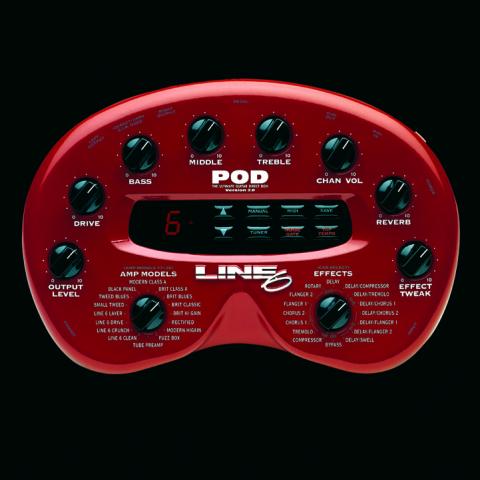Berklee-Line 6 Partnership Is a Win-Win Situation

w
When the Line 6 POD guitar sound processing unit hit the market in 1996, it created quite a stir among recording guitarists. The device enabled guitarists to walk into a studio armed with a number of classic guitar tones inside a small kidney-shaped unit. Ready to plug in and record directly, the POD eliminated the process of setting up an amplifier, selecting and placing microphones, and then working with the engineer until the guitar sound was acceptable.
Line 6 has recently made a sizeable gift to Berklee, including PODs, Variax guitars, and Flextone amplifiers. Members of Berklee’s Guitar Department faculty have found the Line 6 equipment to be a great resource for their classes. I’ve adopted the Variax as my basic instrument in my recording techniques lab. I may use it demonstrate EQ options to my students. If they are recording a Fender Strat (I select that guitar on the Variax), I show them what type of EQ works well. With a quick change on the Variax, I can dial up the sound of a Gibson Les Paul and offer the class EQ suggestions for that sound.

POD 2.0 guitar sound processor
The concept of Line 6 has been to create convincing “models” of vintage and modern amplifiers and effects, and the company has upped the ante with the Variax instrument series to emulate classic guitars (electric and acoustic) as well as basses. I recently brought a Variax over to a friend’s house to compare its modeled sounds to those of his fine collection of instruments. We were floored when we couldn’t hear the difference between the Variax modeled sounds and many of the originals. I use the Variax extensively when teaching recording techniques lab.
Having used Line 6 gear on my own recordings and on projects I’ve mixed for others, I can safely say that the Line 6 concept of modeling has changed the landscape of modern recording. This goes beyond the scope of guitar and bass, since PODs and other Line 6 processors are often used to add life and attitude to synth, organ, electric piano, and drums. The speed with which a wide variety of useful sounds can be called up is of great value in the creative process, allowing professional or student musicians to realize new ideas and production possibilities very efficiently. I have a fond memory of earning what was probably the highest hourly wage of my career in a session with composer Michael Whalen for a Good Morning America television theme variation. This was due largely to the fact that we got great tones out of my POD in a matter of minutes.
“By partnering with Berklee,” says Line 6 president Mike Muench, “we can ensure that students have access to state-of-the-art guitar recording and performance products, and Line 6 can learn from some of the most talented and dedicated musicians in the world new ways to apply this technology to music creation. These insights can further fuel our ideas for new products in the future.”
We at Berklee appreciate this relationship with Line 6, and look forward to the results of our partnership being reflected in further innovations from the company.
—Associate Professor Randy Roos




